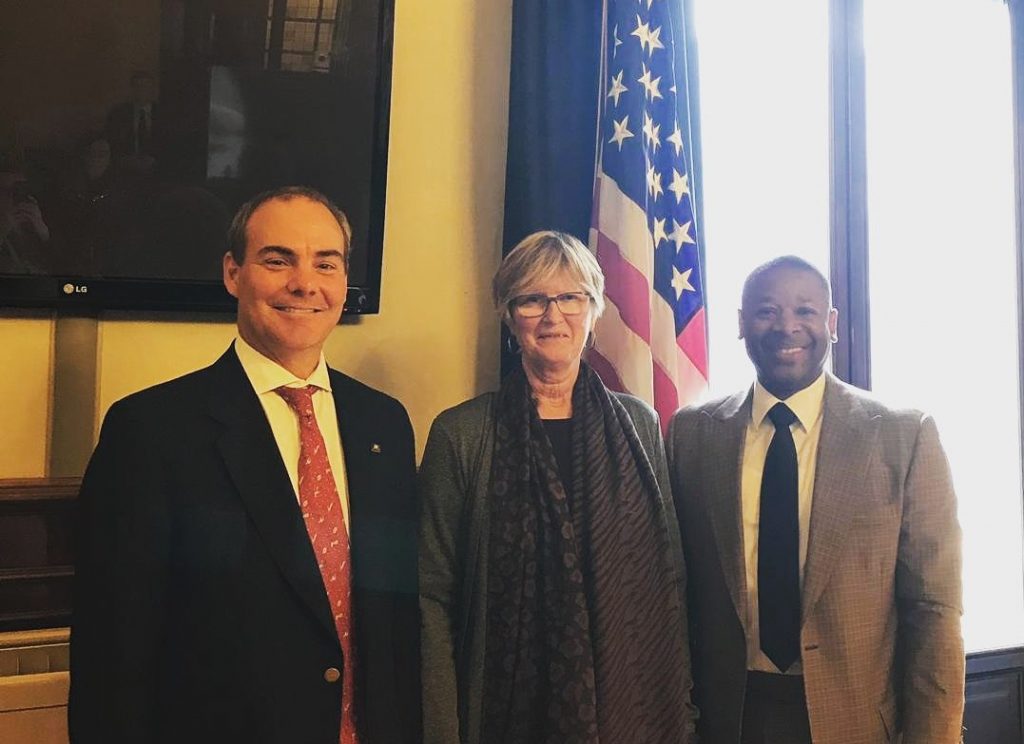Corn farmers representing the United States, Argentina and Brazil joined together this month to share why biotechnology and plant breeding innovations (PBIs) like gene editing are important to the future of farming during meetings at the Committee on World Food Security (CFS) at the Food and Agriculture Organization of the United Nations (UN FAO) and at the European Commission.
Juan Minvielle, corn farmer from Argentina and president of MAIZALL – the international maize alliance – and Pam Johnson, Iowa corn farmer and a previous MAIZALL president, traveled to Europe with staff from the U.S. Grains Council (USGC) and the National Corn Growers Association (NCGA). During the CFS meeting in Rome and 10 individual meetings with European Union officials and stakeholders in Brussels, the MAIZALL delegation highlighted the importance of innovation and sound, science-based policy. These discussions largely centered on advancements in crop breeding – including biotechnology and plant breeding innovations (PBIs) like gene editing – and transparent and scientifically based international policies – including import tolerances and maximum residue levels (MRLs) for crop protection substances.
“MAZIALL’s main objective was to promote innovative and modern agriculture as one of the accepted methods of production at the FAO,” said Allison Nepveux, USGC manager of trade policy and lead on innovation and sustainability issues. “During each meeting, MAIZALL members emphasized the importance of innovation in driving continuous improvement in farming operations that benefits the world’s farmers, environment and society as a whole.”
More than 350 FAO member country officials and private sector representatives attended a side meeting in Rome on the future of farming. Minvielle presented on the economic and environmental benefits of the combined use of no-till farming, cover crops and biotechnology on his farm and in Argentina. This session was an important effort in bringing balance and perspective to discussions that often promote agroecology as the only acceptable farming system. MAIZALL and the other pro-innovation panelists provided much-needed perspective on the many ways to accomplish sustainability and climate change goals, most of which require the adoption of biotechnology and crop protection tools.
“The farmers’ voices continue to carry weight when discussing the benefits of biotechnology and the efficient use of inputs in agriculture,” Nepveux said. “The officials appreciated the insights from the MAIZALL farmers on the importance of biotechnology to achieve economic, environmental and efficiency goals.
“Many of the officials were clearly not aware of the key role of biotechnology in expanding no-till farming and other agricultural advancements and asked for additional information.”
MAIZALL’s active role in these international platforms is especially important as the new European Parliament continues to exert political pressure by adopting non-binding resolutions that oppose every new biotech crop in the pipeline. The European Union’s (EU’s) policies on import tolerances for crop protection products are also becoming more problematic as an increasing number of active ingredients are being banned, or their MRLs are reduced to very low default levels well below international science-based standards.
“These actions hinder not only technology adoption by European farmers, but also limit market opportunities to sell U.S. coarse grains and co-products into the European market or in markets influenced by the European Union,” Nepveux said. “Even if there is no clear or immediate result, the narrative on highly adopted practices in the top three corn-exporting countries works to counter more radical demands from within the European Union.”
With respect to PBIs, there have been encouraging signs within the EU that the advocacy efforts by farmers, the scientific community and the plant breeding industry are starting to have a positive effect as several member states are pushing the European Commission to develop more favorable policies regarding these new crop breeding techniques.
“MAIZALL is on the right track with its strategy to challenge the European Union through the World Trade Organization and engage in the policy dialogue at the UN FAO,” Nepveux said. “MAIZALL members will continue to work together to communicate the importance of these crop breeding advancements during future meetings on the world stage.”
About The U.S. Grains Council
The U.S. Grains Council develops export markets for U.S. barley, corn, sorghum and related products including distiller’s dried grains with solubles (DDGS) and ethanol. With full-time presence in 28 locations, the Council operates programs in more than 50 countries and the European Union. The Council believes exports are vital to global economic development and to U.S. agriculture’s profitability. Detailed information about the Council and its programs is online at www.grains.org.

